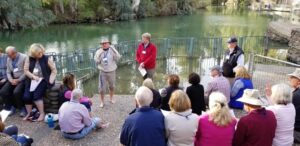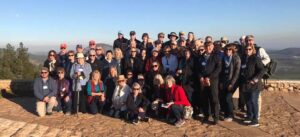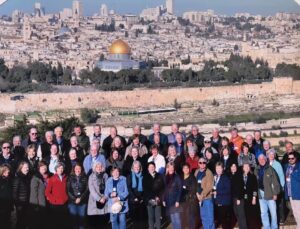In January of 2019, a group of Presbyterians from the Lowcountry region of South Carolina were preparing to depart for a pilgrimage to the Holy Land. In preparation of their departure, one of the group leaders decided to offer a sermon to help the group members (and the church, at large) better understand why they were going, what they would see and how it might impact their lives.
Thank you to the Rev. Dr. L. Holton Siegling, Jr., of First (Scots) Presbyterian Church, in Charleston, SC, for not only writing and delivering that sermon, but for allowing us to share it with you. We hope you enjoy this sermon and learning more about how pilgrimage travel can become a tool to enhance your community ministry and mission.

“What the Holy Land Can ‘Tel’ Us”
Judges 7:1-8; Acts 10:23b-26, 12:20-23
As many of you already know, 56 members and friends of our church family will be leaving this Thursday for a two-week pilgrimage to the Holy Land. Danny Massie and I began planning this journey to Israel and select sites in Jordan and Egypt nearly a year ago and we are not bashful to solicit your prayers for the whole team while we are away.
We call it a “pilgrimage” because, by following in the footsteps of Jesus, ours will be, by God’s grace, a very spiritual journey, whereby we will grow not only as individuals, but also, together, as members of the Body of Christ.
At the heart of our pilgrimage is a most wonderfully illustrated version of our Biblical heritage – the Land! In fact, over the years, the Land has come to be affectionately dubbed: “The Fifth Gospel.” As such, the Land is for us an expression of the richness of God’s grace.
Having been there once before, you can imagine how my understanding of the Biblical witness has been profoundly influenced by the places where so many of the stories that we have known since we were young actually took place.
A word that our Holy Land pilgrims will come to know very well by the time our journey is over is the word “tel,” spelled t-e-l. A tel refers to a mound of earth – something resembling a great big hill – and under it are literally layers upon layers of archeological evidence bearing witness to any number of generations of people having lived and built upon the same spot.
Take the place called Megiddo, for example. Archaeologists have excavated the earth at Megiddo in such a way that some of the 27 layers of occupation can be seen – layers one on top of another.
It’s like you are looking at the layers of a cake. There’s evidence of the Period of Conquest when Joshua defeated the King of Megiddo. There’s also evidence of the Period of the Judges when Deborah and Barak defeated Sisera and his armies “by the waters of Megiddo.”
Those chapters in human history, as well as many, many others, are evident to the skilled eye of an archaeologist when they look closely at what is called the “Tel Megiddo.”
Now, though there’s hardly anything left of Megiddo today, it certainly isn’t relegated to antiquity. On the contrary, when we read the Book of Revelation we eventually run across the word that had been translated “Armageddon,” which finds its root in the name Megiddo. So, clearly, there appears to be more to come as far as that site is concerned and as it relates to God’s story of salvation.
What is especially interesting to me is that the Holy Land, whether we are there or reading about it in the Word of God written, it functions very much like a “tel” in the sense that we see so many things – so much history – so many Biblical connections…it hard to keep it all straight
I dare say that, in much the same way, our lives function much like a “tel,” because just below the surface of who we are lies the milieu of where we have been, the vast foundational layers of people and places and things upon which our lives have been built.
Now, as Christians, we know and believe that Christ is our truest foundation, and so it should come as no surprise to hear me say that, at the end of the day, our “tel” will always look decidedly different from an earthen tel. And the reason for this is because the loving claims of the Gospel, they will not tarnish – the promises of God in your life and in mine, they will not erode with the passing of time!
For this reason, when someone looks at the life of a child of God, they will not see a temporal accumulation of stuff – layers of dust and debris which mark the perishable. On the contrary, what they will behold is a cumulative and enduring and living witness – a very spiritual legacy!
But mark my words, dear friends, because this only happens when our life’s foundation is God, and when our cornerstone is Jesus Christ, our Lord!
You see, when we put ourselves first, when our attitudes and activities become the center of our attention; when we presume that we have done very well for ourselves – ah, when we do these things, we are effectively focusing on our life and our living, and we, ourselves, inadvertently become an idol. 
One of the sites our team of Holy Land pilgrims will visit in the coming days is Mt. Sinai. It is there that God revealed himself to Moses and gave him the Ten Commandments, and, in doing so, God made it abundantly clear that, “[We] shall have no other God’s before [Him].”
Now this divine imperative was coming from the one Living God who also says: “For I the Lord your God am a jealous God…” In other words, God is absolutely determined to be first in your life and in mine. That is how God has deigned it to be, and the sooner we figure that out, the better.
This reality really hit home for me when some years ago I found myself standing on top of another mountain that we will soon visit — Mt. Nebo.
At the top a visitor can look out and see something of what Moses saw some 3300 years ago…the Promised Land! What is particularly humbling about standing in that place, however, is the realization that Moses would see no more of the Promised Land than that particular mountaintop view, for God had decided that Moses would not enter therein.
And why was that? Why did God say in Numbers 20:12: “Because you did not trust in me, to show my holiness before the eyes of the Israelites, therefore you shall not bring this assembly into the land that I have given them.”
Well, to make a long story short, there was a time when God’s people were in desperate need of water, and the Lord told Moses to speak and that water would come forth from a rock. We know from the Scriptures that Moses struck the rock instead of simply speaking as he had been commanded.
What’s more, church history has also located the essence of the problem in what Moses said just before the miracle took place. “Listen, you rebels,” Moses says, “shall we (referring to Moses and Aaron) “…shall we bring water for you out of this rock?”
Did you hear that? …The “we,” that is! As if Moses and Aaron had such power to bring forth water from a rock! To be clear, water coming from a rock was an amazing miracle, and a lifesaving miracle at that; but, it was not Moses’ miracle, it was God’s!
Oh, Moses played a significant role in leading God’s people out of bondage alright, but the children of God would enter into God’s future, not because of Moses, but because of God!
Think back, if you will, on the Transfiguration; that occasion when Jesus’ ascended Mt. Tabor with Peter and James and John. I used to think that those three disciples functioned as Jesus’ inner circle, and, of course, I still do; however, having driven to the top of Mt. Tabor, and as our team of pilgrims will soon find out for themselves, I can’t help but to playfully wonder if those three disciples were up there because they were the only ones in good enough shape to make the climb!
It was on the top of that mountain that Jesus’ appearance changed and his clothes became a dazzling white, and Jesus is seen in the company of Moses and Elijah.
Peter is moved to commemorate the moment and offers to build three booths; one for Moses, one for Elijah and one for Jesus. But “while he was still speaking,” the Bible says, a voice came from heaven saying: “This is my Son, the Beloved; with him I am well pleased; listen to him!”
At that, the disciples fall to the ground, and when they finally look up again…they see no one but Jesus himself, alone. Simply put, God in Christ is not going to be upstaged by anyone…or anything…at any time!
Consider again this morning’s Old Testament Lesson. The location of this story is called Herod’s Spring. This is yet another place that our team will visit – and while we are there we will see that to this day the water still flows, though not very much!
This was the backdrop for that occasion when Gideon was going up against the Midianites and he had an army at his command; a large army, some 32,000 soldiers!
But that proved to be too large a number for God’s purposes, and so God declared: “The troops with you are too many for me to give the Midianites into their hand. Israel would only take the credit away from me, saying, ‘My own hand has delivered me.’”
And so God began a process whereby that number was whittled down. The final number was determined by the men who lapped up the water of the spring like a dog…and this left a mere 300 soldiers – nothing more than a gnat in the face of the Midianite Army; an army which we are told, “lay along the valley as thick as locusts.”
God’s people won the battle that day, but the real victor was God! This was not altogether different from the time when young David showed up to face Goliath in the Valley of Elah. There’s something special about standing there in that valley, and picturing the Israelites on one hill and the Philistines on another, and listening again for what David said. “This very day the Lord will deliver you into my hand…so that all the earth may know that there is a God in Israel.”
Indeed, praise be to “God” from whom all blessings flow; yet, oh, how difficult that is for us to remember! You see, too often we meet the praise that the world occasionally heaps upon us with a sense of personal accomplishment, and, when that happens, the “tel” of our lives – that cumulative and living witness that is ours – it ends up revealing who we are, rather than who God is!
And when that happens, our life of faith becomes like that proverbial house built upon the sand, because when the rains fall – and they will fall – the sandy sediment of our assumed sovereignty, it begins to wash right away, and each layer of our lives begins to blend with the previous level, basically leaving us with a muddy, convoluted mess…with each chapter nearly indistinguishable from the other.
However, there is a far better way, and it happens when our lives are lived with humility – when we worship God not on a mountain or in a valley, but in spirit and in truth – when every moment that we have is spent pointing away from ourselves and toward God, for when that happens, and by God’s grace, there is built an even stronger foundation, a foundation upon which we can make every new experience and every new relationship stronger than the ones that preceded them.
Consider the differences between Herod and Peter in our two readings from Acts this morning? Notice what sets them apart?
I’ll tell you one thing that our Holy Land Pilgrims will notice when we visit the city of Caesarea by the sea, and that is that the location of both those two stories was probably no more than 300 yards apart.
There in the city’s ancient theater the people praised Herod Agrippa, who is described as having “the voice of a god, and not of a mortal!” and yet it was also there, and, according to the Bible: “because he had not given the glory to God, an angel of the Lord struck him down, and he was eaten by worms and died.”
But the other place, very nearby, is the one where Peter had been – he had come to the home of that Roman Centurion, whose name was Cornelius.
The Bible tells us that Cornelius fell at Peter’s feet and worshipped him. But, unlike Herod, who received a similar kind of praise but offered no word of correction, Peter says, “Stand up; I am only a mortal.”
Now I seriously doubt that anyone is ever going to confuse us for gods! Ours will likely never be a situation like the one Paul and Barnabas experienced when the people of Lystra mistook them for members of the Greek Pantheon.
But, tell me, will there never be those occasions when people will commend us on how we have come through the wilderness, or praise us for having defeated some giant obstacle in our lives, or celebrate our accomplishments as individuals or as a church family?
Is that not also a time for us to say, as Paul and Barnabas said to these people in Lystra: “Friends, why are you doing this? We are mortals just like you….”
Indeed, there is but one who is worthy of our praise; only one upon whom the foundation of our lives can be built, and that is the Christ who gave his life for us, he died for our sins and rose again, so that, when we believe in Him, we might live forever with God in heaven!
 One of the things I am very much looking forward to about our upcoming pilgrimage, is taking time to reaffirm our baptismal vows in the River Jordan.
One of the things I am very much looking forward to about our upcoming pilgrimage, is taking time to reaffirm our baptismal vows in the River Jordan.
We will be in the general area where Jesus himself was baptized; that place where he identified with us – with humanity…never asking us to do anything that he wasn’t willing to do himself.
In the sacrament of Baptism we mark our identity as children of God and we say to the world that God loves us, and that Jesus Christ is utterly and completely foundational to our life of faith.
Friends, when our lives are founded upon that eternal bedrock, and when the adhesive that holds each layer of our lives together is none other than God’s Holy Spirit; and when our lives become more about God and less about us, the “tel” of our lives will prove to be not the space we occupy. No! We are not some archaeological site. We are part of the narrative of God’s grace — the story that God tells!
Let us pray. Lord, as we live grateful lives for the stories of the Bible and the places where they happened, may we know and believe that there is nowhere we can be where you are not, even in the humblest of human hearts. In the name of the Father and of the Son and of the Holy Spirit. Amen.

 [mashshare]
[mashshare]